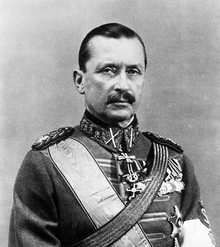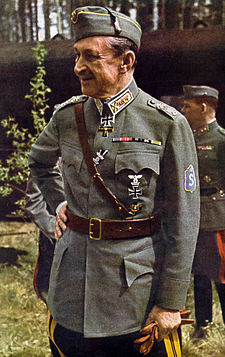
Carl Gustaf Emil Mannerheim (4. kesäkuuta 1867 Askainen – 27. tammikuuta 1951 Lausanne, Sveitsi) oli kuudes Suomen tasavallan presidentti (1944–1946), Suomen marsalkka ja yksi itsenäisen Suomen historian keskeisistä henkilöistä.
Hän myös palveli lähes kolmekymmentä vuotta Venäjän keisarikunnan armeijassa, jossa osallistui Venäjän–Japanin sotaan ja ensimmäiseen maailmansotaan.
Hän toimi ylipäällikkönä jokaisessa Suomen itsenäisyyden ajan neljässä sodassa sekä jälkimmäisenä valtionhoitajana.

Hitler ja Mannerheim marsalkan 75-vuotispäivänä 4. kesäkuuta 1942.
Carl Gustaf Emil Mannerheim (suomi)
------------------------------------------------------------------
Mannerheim Finnish language it's too bad, like Churchill's French language.
Carl Gustaf Emil Mannerheim (english)
6th President of Finland
In office: 4 August 1944 – 4 March 1946
Prime Minister: Antti Hackzell
Urho Castrén
Juho Kusti Paasikivi
Preceded by: Risto Ryti
Succeeded by: Juho Kusti Paasikivi
Chief of Defence of the Finnish Defence Forces
In office:17 October 1939 – 12 January 1945
Preceded by: Hugo Viktor Österman
Succeeded by: Axel Erik Heinrichs
In office: 28 January 1918 – 30 May 1918
Preceded by: post created
Succeeded by: Karl Fredrik Wilkman
Regent of Finland: In office12 December 1918 – 25 July 1919
 Preceded by: Pehr Evind Svinhufvud
Preceded by: Pehr Evind SvinhufvudSucceeded by: Kaarlo Juho Ståhlberg as President of the Republic
Personal details
Born: 4 June 1867 Askainen, Grand Duchy of Finland, Russian Empire
Died: 27 January 1951 (aged 83) Lausanne, Switzerland
Resting place: Hietaniemi cemetery, Helsinki
Nationality: Finnish
Spouse(s): Anastasie Mannerheim, born Arapova (divorced 1919)
Children: Anastasie, 23.4.1893–1977, Sophie, 15.7.1895–1963
Profession: Military officer and statesman
Religion: Lutheranism
Military service:
Allegiance: Russian Empire, Finland
Service/branch: Imperial Russian Army, White Guard Finnish Army
Years of service: 1887–1917 (Russia)
1918–1946 (Finland)
Rank: Lieutenant General (Russia), Field Marshal (Finland)
Battles/wars:
Russo-Japanese War
World War I
Finnish Civil War
World War II
Winter War
Continuation War
Lapland War

White Army Commander, Finnish Civil War 1917

Army Commander Winter War

Commander-in-Chief Continuation War

Commander Lapland War
------------------------------------------------------------------
Baron Carl Gustaf Emil Mannerheim (Swedish pronunciation: [ˈkɑːrl ˈɡɵsˌtɑv ˈeːmil ˈmanːərˌheim]) (4 June 1867 – 27 January 1951) was a Finnish military leader and statesman.
Mannerheim served as the military leader of the Whites in the Finnish Civil War, Regent of Finland (1918–1919), commander-in-chief of Finland's defence forces during World War II, Marshal of Finland, and the sixth president of Finland (1944–1946). In a Finnish survey 53 years after his death, Mannerheim was voted the greatest Finn of all time.

C.G. E. Mannerheim in the Victory Parade in Helsinki after the Finnish Civil War 1918.
Given the broad recognition in Finland and elsewhere of his unparalleled role in establishing and later preserving Finland's independence from Russia, Mannerheim has long been referred to as the father of modern Finland, and the Finnish capital Helsinki's Mannerheim Museum memorializing the leader's life and times has been called "the closest thing there is to a national shrine."

Mannerheim was born in the Grand Duchy of Finland, Russian Empire (name in Russian: Густав Карлович Ма́ннергейм, tr. Gustav Karlovich (lit."Karl's son") Mannerheim), into a family of Swedish-speaking aristocrats who had settled in Finland in the late 18th century.
His paternal German ancestor Marhein had emigrated to Sweden during the 17th century. His maternal ancestry has its roots in Södermanland, Sweden.
Mannerheim was appointed the military chief of the Whites. Twenty years later, when Finland was twice at war with the Soviet Union from late 1939 until September 1944, Mannerheim successfully led the defence of Finland as commander-in-chief of the country's armed forces.
Hitler, President Risto Ryti and Marshal Mannerheim.4.6.1942 / Mannerheim 75 birthday
In 1944, when the prospect of Germany's defeat in World War II became clear, Mannerheim was elected President of Finland and oversaw peace negotiations with the Soviet Union and the United Kingdom.
(Finland was never at war with the United States.)
He resigned the presidency in 1946 and died in 1951.
So serious man ;)
VastaaPoistaGood morning, J-C
Poista:) Yep.
He was a very serious man and a pedant, especially eating and drinking habits.
In him was also a lot of the same behavioral style,
like a monty little later...
Yes, he was too serious, like we both are, no waste any laughter...
Very interesting. Certainly an interesting and productive man!
VastaaPoistaHi Rodger.
PoistaYes, in many ways more interesting.
The Emperor's wife's special favorite.
In the past few years, there has been a lot of debate (TV - radio)
because he seems to have had a also homosexual.
This especially in the Far East (China - Mongolia) time
where he was the Czar's of command reasons.